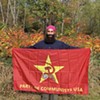Published April 18, 2007 at 1:57 a.m.
COLCHESTER - The co-author of a disputed study on the Iraq death toll is scheduled to join the outspoken former head of the U.N.'s Africa AIDS program in addressing an upcoming global health conference at St. Michael's College.
In defending his own team's estimate of 655,000 war-related deaths in Iraq, Columbia University epidemiologist Les Roberts takes aim not only at the Bush administration but also at a less predictable target. Roberts blames relief organizations working in Iraq for failing to give an accurate accounting of the lives lost to war in the past four years.
The figure of Iraqi dead Roberts uses is roughly equivalent to the population of Vermont. It is based on a survey of households Iraqi physicians carried out in conjunction with the Johns Hopkins School of Public Health. The results of the study were published last year in the British medical journal The Lancet.
European and U.S. nongovernmental organizations (NGOs) operating in Iraq are guilty of "going along with the whole embedding process that limited the media's ability to report accurately on the invasion and occupation," Roberts charges. He accuses the NGOs of "blurring the definition of 'humanitarian' so much that they've turned into something close to military collaborators."
President George W. Bush suggested last December that about 30,000 Iraqis had been killed since the start of the U.S. occupation in 2003. Roberts dismisses that figure as "absurd," noting that in proportional terms, it's less than the combined murder rates in Baltimore, Detroit and New Orleans during the same period. "Those cities are violent, but not like Iraq," Roberts says.
"How can we have the public health community and the NGOs on the ground in Iraq allowing that level of distortion?" Roberts wonders.
His team's estimate is also about 10 times greater than that of Iraq Body Count, an independent monitoring organization based in London. Iraq Body Count claims that up to 67,000 civilians have been killed so far as a result of the U.S.-led military intervention.
No one disputes the toll of the AIDS epidemic in Africa - another topic to be addressed at the St. Mike's conference. About 30 million Africans have died of AIDS-related causes in the past 25 years, the United Nations estimates.
Stephen Lewis, the U.N.'s former point man for AIDS in Africa, will discuss the scope of that calamity in his keynote address at the April 26 conference.
During his five-and-a-half years on the frontlines of the global AIDS epidemic, the Canadian diplomat earned a reputation as an undiplomatic adversary of leadership in both Africa and the developed world. He intends to be just as outspoken in Vermont next week, he says.
Lewis promises to condemn the "ominous and extraordinary decline in foreign aid" during the past two years. The scale-back contradicts Western donor nations' pledges to devote many more resources to fighting global poverty and its symptoms. Wealthy countries must be prodded to make good on their rhetorical commitments to prevention and treatment of AIDS in Africa, Lewis says.
He acknowledges that thousands of Africans' lives have been saved as a result of President George W. Bush's $15 billion AIDS-relief initiative. But the Bush program's "obsession with abstinence has done a great deal of damage," Lewis adds. "Its dominance over distribution of condoms has been very detrimental to the struggle."
And how will a demand for wider access to condoms be received at a conference predicated on "a Catholic vision of peace and development?"
Without open opposition from conference coordinator Laurie Gagne, director of the college's Edmundite Center for Peace and Justice.
"Catholic teaching is in favor of abstinence, of course," Gagne says. "But I think Catholics are only being realistic when we acknowledge that when we commit to working in a global way, we're going to have to accept some tensions."
Vermont may seem an unlikely location for a Global Health Conference, but Nils Daulaire, who is also involved in the event, claims it's ideal. He's director of a research and advocacy organization called Global Health Council that has offices in White River Junction. He says the issues he, Roberts and Lewis raise can be addressed more readily from Vermont than from Washington.
"What's striking is the degree to which Washington is focused on itself," Daulaire observes. "Vermont, on the other hand, is a terrific place for focusing on global health concerns because of its sense of community and connectedness - the commitment here to making sure others have what they need to get by."
Vermonters attending the all-day event at St. Michael's will be challenged to act on the commitment cited by Daulaire, who also emphasizes the need for activism by warning that "what happens in faraway places winds up coming home." Diseases can now spread around the world "at almost supersonic speeds," he notes. And miserable living conditions in Africa, Asia and Latin America can further threaten the health and welfare of Vermonters by "serving as a major source of instability, conflict and terrorism."
In addition to speeches by public-health luminaries, the conference will include a series of midday workshops, including some led by St. Michael's students. These sessions will address related topics such as the availability of generic AIDS drugs for children, the health effects of poor countries' indebtedness, and the shortage of health-care workers in the developing world.
St. Michael's College hosts The Global Health Conference on Thursday, April 26, from 10 a.m. to 8:30 p.m. It's free and open to the public. Info, 654-2205.
More By This Author
Speaking of...
-

Saint Michael's College Names New President
Oct 30, 2023 -

The Over-60 Crowd Steps Up With Bill McKibben's Climate Action Group Third Act
Mar 29, 2023 -

A Youth-Activism Camp in Marshfield Stands Up to a Zoning Complaint From the Town
Feb 1, 2023 -

Melinda Moulton Has Blended Business Savvy and a Hippie Ethos to Transform Burlington
Aug 31, 2022 -

Friends Mourn Tony Redington, Burlington's Most Outspoken Transportation Advocate
Aug 25, 2022 - More »
Comments
Comments are closed.
From 2014-2020, Seven Days allowed readers to comment on all stories posted on our website. While we've appreciated the suggestions and insights, right now Seven Days is prioritizing our core mission — producing high-quality, responsible local journalism — over moderating online debates between readers.
To criticize, correct or praise our reporting, please send us a letter to the editor or send us a tip. We’ll check it out and report the results.
Online comments may return when we have better tech tools for managing them. Thanks for reading.















































